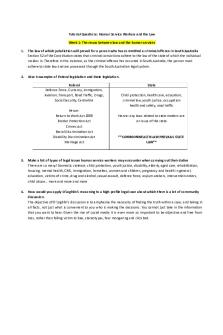Tutorial 3 - Questions - Rape PDF

| Title | Tutorial 3 - Questions - Rape |
|---|---|
| Course | Criminal Law |
| Institution | University of Liverpool |
| Pages | 2 |
| File Size | 71.1 KB |
| File Type | |
| Total Downloads | 37 |
| Total Views | 150 |
Summary
Rape...
Description
Tutorial 3 – Rape 1. Rebecca is out at a bar one night with her friends. She is dressed up for the evening, wearing a very short skirt and low-cut top. She meets Dan in the bar and the two of them dance together. At certain points the dancing is sexually suggestive. Rebecca has been drinking alcoholic drinks all evening and by the end of the night is heavily drunk (in particular, her speech is slurred). In contrast, Dan has sobered up. The atmosphere between the two of them is light-hearted and they flirt with each other. As the bar closes, Dan offers Rebecca a taxi ride home, which Rebecca accepts. Instead of taking Rebecca home, Dan asks the taxi driver to take them back to his student house. Rebecca thinks this is a joke, but desperately needs the toilet so asks if she can go inside. She has also sobered up slightly. Inside the house, Dan pours Rebecca a number of drinks. She drinks the first enthusiastically and within a short time is heavily drunk again. At times, Rebecca is so intoxicated that Dan has to hold the glass to her mouth and pour the liquid in. Rebecca begins to drift in and out of consciousness from all the alcohol. Dan decides to take Rebecca upstairs to his bedroom and has sexual intercourse with her, thinking she is ‘in the mood’. The next day Rebecca reports Dan to the police. Dan claims that on the way back home in the car Rebecca had said that she wanted to have sex with him. Advise Dan as to his liability, if any, for rape.
2. Read K. Laird, ‘Rapist or Rogue? Deception, Consent and the Sexual Offences Act 2003’ [2014] Criminal Law Review 492. (a) What problems does Laird suggest that cases of ‘sex by deception’ pose for the criminal law? (b) What are Laird’s suggestions for addressing these problems? 3. Read N. McKeever, ‘Can a Woman Rape a Man and Why Does it Matter?’ (2018) Criminal Law and Philosophy (Advance access, not yet assigned to an issue – https://doi.org/10.1007/s11572-018-9485-6). (a) Should so-called ‘forced-to-penetrate’ cases involving male victims be criminalised as rape or a different offence?
Essential Reading: - LAW107 J. Child and D. Ormerod, pp. 280 – 299. - LAW307 A. Simester and G. Sullivan et al, pp. 485 – 514 (ignoring ‘Common element 1: sexual conduct’ at pp. 487 – 492). - R v. Bree [2007] EWCA Crim 256. - R v. Kamki [2013] EWCA Crim 2335. - R (Monica) v DPP [2018] EWHC 3508. * K. Laird, ‘Rapist or Rogue? Deception, Consent and the Sexual Offences Act 2003’ [2014] Criminal Law Review 492. * C. Sjolin, ‘Ten Years On: Consent Under the Sexual Offences Act 2003’ (2015) 79 Journal of Criminal Law 20. * N. McKeever, ‘Can a Woman Rape a Man and Why Does it Matter?’ (2018) Criminal Law and Philosophy (Advance access, not yet assigned to an issue – https://doi.org/10.1007/s11572-018-9485-6).
Further Reading - R v. Wright [2007] All ER 267. - R v. Hysa [2007] EWCA Crim 2056. * J. Elvin, ‘The Concept of Consent Under the Sexual Offences Act 2003’ (2008) 72 Journal of Criminal Law 519. * S. Wallerstein, ‘A Drunken Consent Is Still a Consent – Or Is It?: A Critical Analysis of the Law on a Drunken Consent to Sex Following Bree’ (2009) 73 Journal of Criminal Law 318. * G. Firth, ‘Not An Invitation to Rape: The Sexual Offences Act 2003, Consent and the Case of the "Drunken" Victim’ (2011) 62 Northern Ireland Legal Quarterly 99. * S. Weare, ‘“Oh you’re a guy, how could you be raped by a woman, that makes no sense”: towards a case for legally recognising and labelling “forcedto-penetrate” cases as rape’ (2018) 14 International Journal of Law in Context 110....
Similar Free PDFs

Tutorial 3 - Questions - Rape
- 2 Pages

Tutorial 3 questions
- 1 Pages

Tutorial Questions week 3
- 2 Pages

Tutorial work 3 questions
- 2 Pages

Topic 3 Tutorial Questions
- 3 Pages

Tutorial 3 - Questions Only
- 4 Pages

Tutorial 2 - Week 3 Questions
- 1 Pages

Rape notes
- 5 Pages

Tutorial Questions
- 15 Pages

Criminal Law - Rape Summary
- 5 Pages

Rape and deception (again)
- 4 Pages

Rape Culture in America
- 7 Pages
Popular Institutions
- Tinajero National High School - Annex
- Politeknik Caltex Riau
- Yokohama City University
- SGT University
- University of Al-Qadisiyah
- Divine Word College of Vigan
- Techniek College Rotterdam
- Universidade de Santiago
- Universiti Teknologi MARA Cawangan Johor Kampus Pasir Gudang
- Poltekkes Kemenkes Yogyakarta
- Baguio City National High School
- Colegio san marcos
- preparatoria uno
- Centro de Bachillerato Tecnológico Industrial y de Servicios No. 107
- Dalian Maritime University
- Quang Trung Secondary School
- Colegio Tecnológico en Informática
- Corporación Regional de Educación Superior
- Grupo CEDVA
- Dar Al Uloom University
- Centro de Estudios Preuniversitarios de la Universidad Nacional de Ingeniería
- 上智大学
- Aakash International School, Nuna Majara
- San Felipe Neri Catholic School
- Kang Chiao International School - New Taipei City
- Misamis Occidental National High School
- Institución Educativa Escuela Normal Juan Ladrilleros
- Kolehiyo ng Pantukan
- Batanes State College
- Instituto Continental
- Sekolah Menengah Kejuruan Kesehatan Kaltara (Tarakan)
- Colegio de La Inmaculada Concepcion - Cebu



